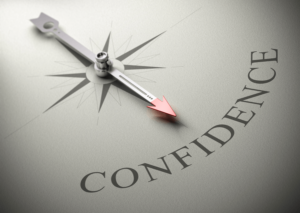“The number-one responsibility of an entrepreneur is to always protect your confidence.” -Dan Sullivan
Confidence is the most important human skill we can develop. It’s a mindset we can adopt and a muscle we can grow. something we need to — and must — work at.
But why is it especially important for an entrepreneur?
Entrepreneurs and, by default, their companies grow by taking risks. Confidence is what’s needed to make that growth happen. Confidence is the ability that activates all your other abilities — protecting and cultivating it daily has to be your number-one goal.
Low confidence happens
Even if you know how important confidence is to your growth, you often end up in a place where it’s low. How does this happen? Every time you commit to doing something new, you’ll likely be taking on new levels of growth that are bigger and beyond your present set of capabilities. As you start to take action toward your goal, you come up against new challenges, new struggles, new opposition. This is where you start to feel “stuck.”
All these obstacles begin to feel overwhelming and start to attack your confidence. While you used to be excited by your goal, now you struggle with new dangers you hadn’t planned for.
When your confidence is low, your motivation to tackle your goal and keep working at it also decreases. This is where trouble starts because the temptation to quit is overwhelming. But to grow as an entrepreneur, you need to persevere.
Confidence isn’t courage

This was likely the case when you first started your entrepreneurial career. It was scary and uncertain, but you had the courage to take the leap. And you were far more confident of your abilities once you actually saw what you were capable of. Once you gain experience in something, it becomes familiar to you, and that’s when confidence kicks in.
My feeling is that courage must be talked about as a necessary part of building confidence in any area. Once courage is accepted as a normal and necessary step first toward achieving goals, we’ll see more and more people who are willing to go through that phase.
Long courage vs. short courage
While you might not have a choice about going through a period of courage, you do have a choice as to whether it’s going to be a long period or a short period. This depends on your level of commitment to your goal. The more committed you are, the shorter the period of courage that will be required.
You also have the option to skip the whole courage step altogether, but you won’t get a result that’s any better than what you’ve achieved before. Courage truly comes into play when you’ve committed yourself to something outside your present level of confidence and capability. This is what leads to breakthroughs and greater success.
Lifetime growth requires a confidence mindset
You can’t avoid challenges, hardships, or periods of courage, so you might as well embrace them.
Because you’re an entrepreneur and constantly take risks in order to grow, you’re going to be faced with all kinds of frustrations and roadblocks. Even if you’re at the top of your game, the world isn’t going to stay the same. You may be confronted with all sorts of crises that require even more painful and scary changes in your life.
And while most people are forced into growth and change by circumstances outside of their control, entrepreneurs voluntarily and regularly scare themselves into growth.
There are countless situations in life where people get a notion that something bigger and better is needed in their life and voluntarily make a change, where others have to be compelled. The ones who voluntarily do it are always enormously more successful than the ones who don’t because it becomes a skill: They are able to continually self-initiate their own growth.
Say, for example, you want to take a boat ride, but you’re afraid to leave the dock. You have one foot in the boat and one on the dock. When you untie the boat and drift out into the water, you’re making a commitment to a new goal to achieve something new. You have to take your foot off the dock. You have to relinquish for a period of time that sense of security you had before and go into a state where you’re experiencing fear and uncertainty.
Only then will your brain invent a new way of doing something that you couldn’t see before. Once you give up the security and enter a period of being fearful and uncertain, your creative brain will assemble and pull together all kinds of new possibilities — and that will lead you to greater confidence.
Confidence: the foundation of all other abilities
Confidence is necessary for growth. You need it to develop every other ability. Individuals with confidence can learn, adjust, and accomplish anything.
People like being around confident people. Not only does staying confident benefit you, it’s also beneficial to those around you. Plus, the more you develop it, the stronger your ability becomes.
Just don’t be afraid to have courage.
